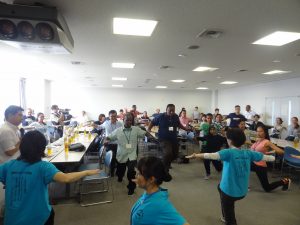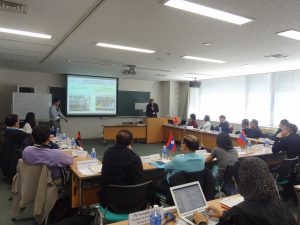WHO/WPRO Strengthening Leadership and Advocacy for the Prevention and Control of Noncommunicable Diseases (LeAD-NCDs) Workshop

In developing countries in the Asia-Pacific region, which come under the jurisdiction of the WHO Pacific Regional Office (WPRO), an increase in the number of people who suffer from lifestyle diseases has become a major health issue. Responsible personnel at the Ministry of Public Health that promote promotes measures against lifestyle diseases in these countries meet together and conduct a workshop to strengthen their abilities. We continually conduct the LeAd-NCDs workshop at the National Institute of Public Health, with an aim to foster personnel who can contribute to the promotion of measures against lifestyle diseases in the Asia-Pacific region by providing our knowledge and examples of our efforts in Japan.
Since many stakeholders are involved with NCDs measures, and it is necessary to carry out the measures comprehensively, a relevant theme is set ever year. We conduct a four-day program to foster personnel, including visiting some projects in Japan that are relevant to the theme of the year.
We summarize a report every year and post it on the official WPRO website annually. The workshop attracts much attention, both domestically and internationally.
WHO/WPRO Hospital Quality and Patient Safety Management

Hospital Quality and Patient safety Management Course with WHO/WPRO (World Health Organization / Western Pacific Regional Office)
WHO/WPRO and NIPH (National Institute of Public Health) co-organize this course every year since 2014, with funding support from the Ministry of Health, Labour and Welfare, Japan, in order to strengthen the capacity of senior hospital managers because we recognized the importance of improving safe and effective hospital service delivery and more needs to support capacity development for hospital quality and patient safety management in the region.
The course has been attended by more than 60 participants in total, from the following countries: Cambodia, Fiji, the Lao People’s Democratic Republic, Mongolia, the Philippines, and Viet Nam. The Participants were government officials and senior hospital managers working on hospital quality and patient safety issues.
The objectives of the course in the past were to:
1) apply concepts and tools to improve and monitor quality of hospital care and patient safety;
2) learn how to engage individuals, families and communities in health service design and delivery to improve quality and health outcomes; and
3) develop an action plan for improving quality of care, patient safety and people-centred care in their hospital.
Key concepts/topics covered were the followings:
• Equity in access to health services – leaving no one behind
• Patient safety and quality improvement practices
• Development of people-centred health services, including the elderly simulation
• Leadership and governance in hospital management, including team training such as TeamSTEPPS®
• Patient safety in traditional, complementary and alternative medicine ( the visit to Kitasato University Oriental Medicine Research Center)
• Healthcare accreditation ( the visit to St. Luke’s International Hospital)
• Patient, family and community engagement (the visit to Shinkatsushika Hospital)

